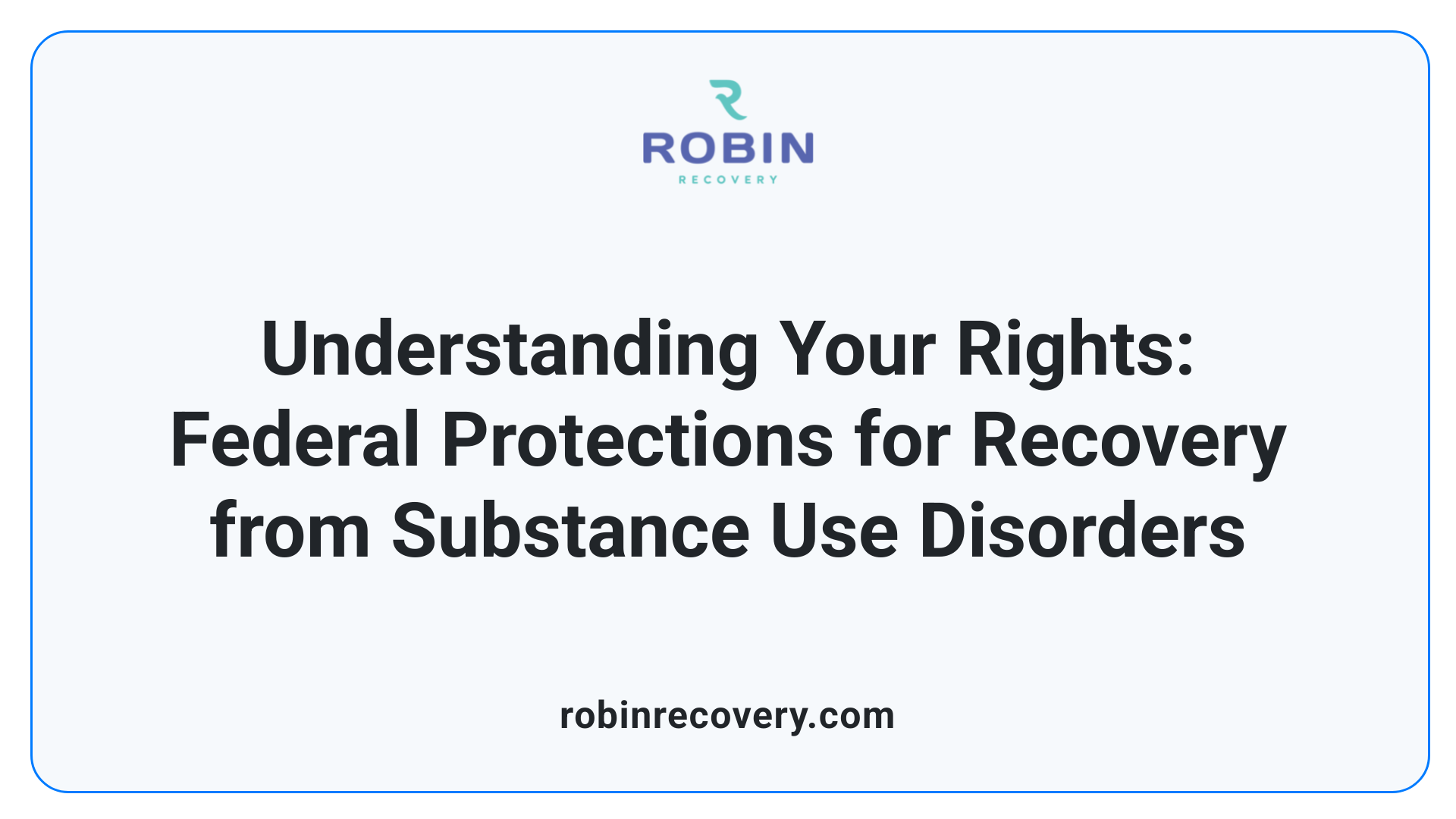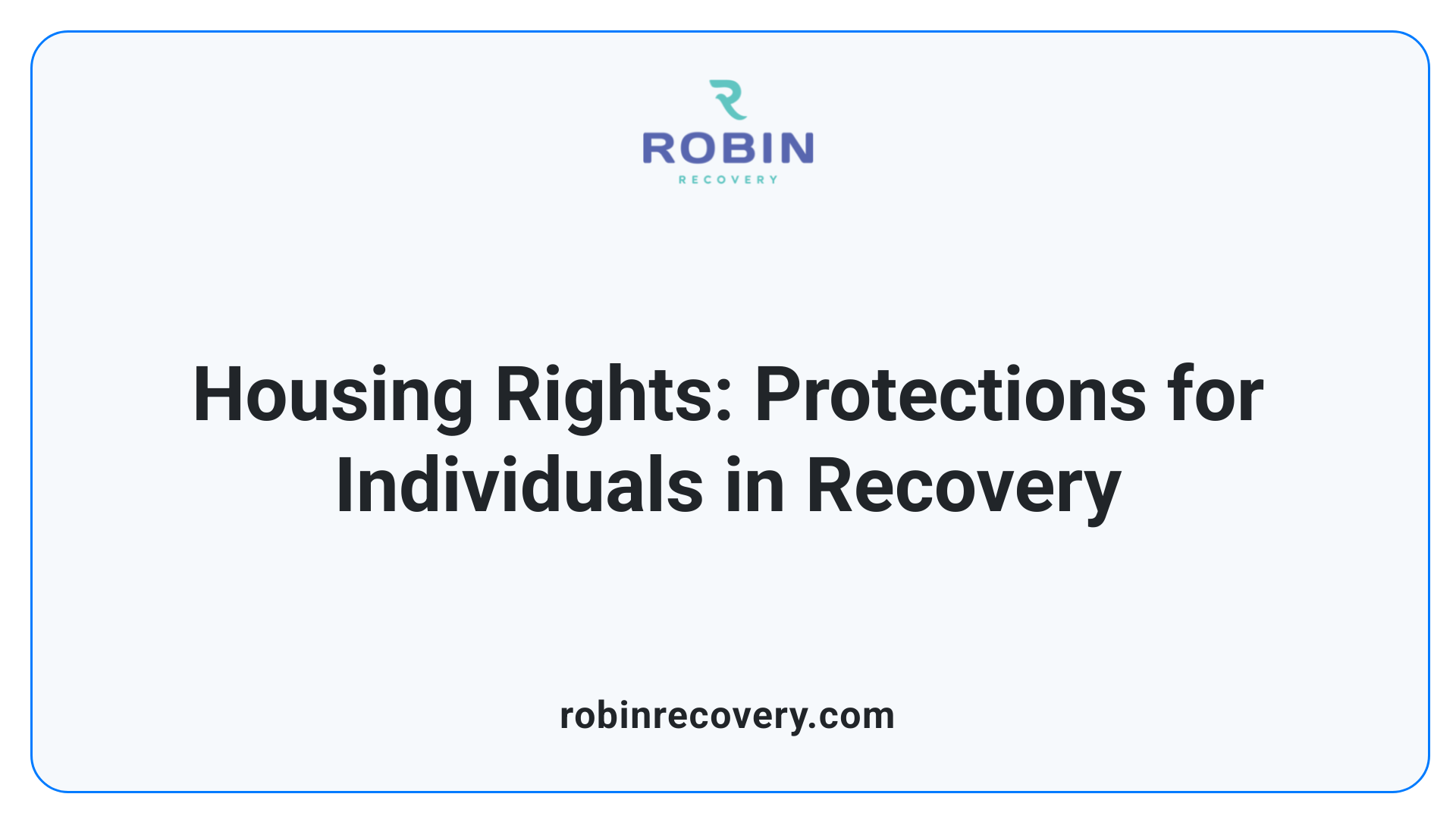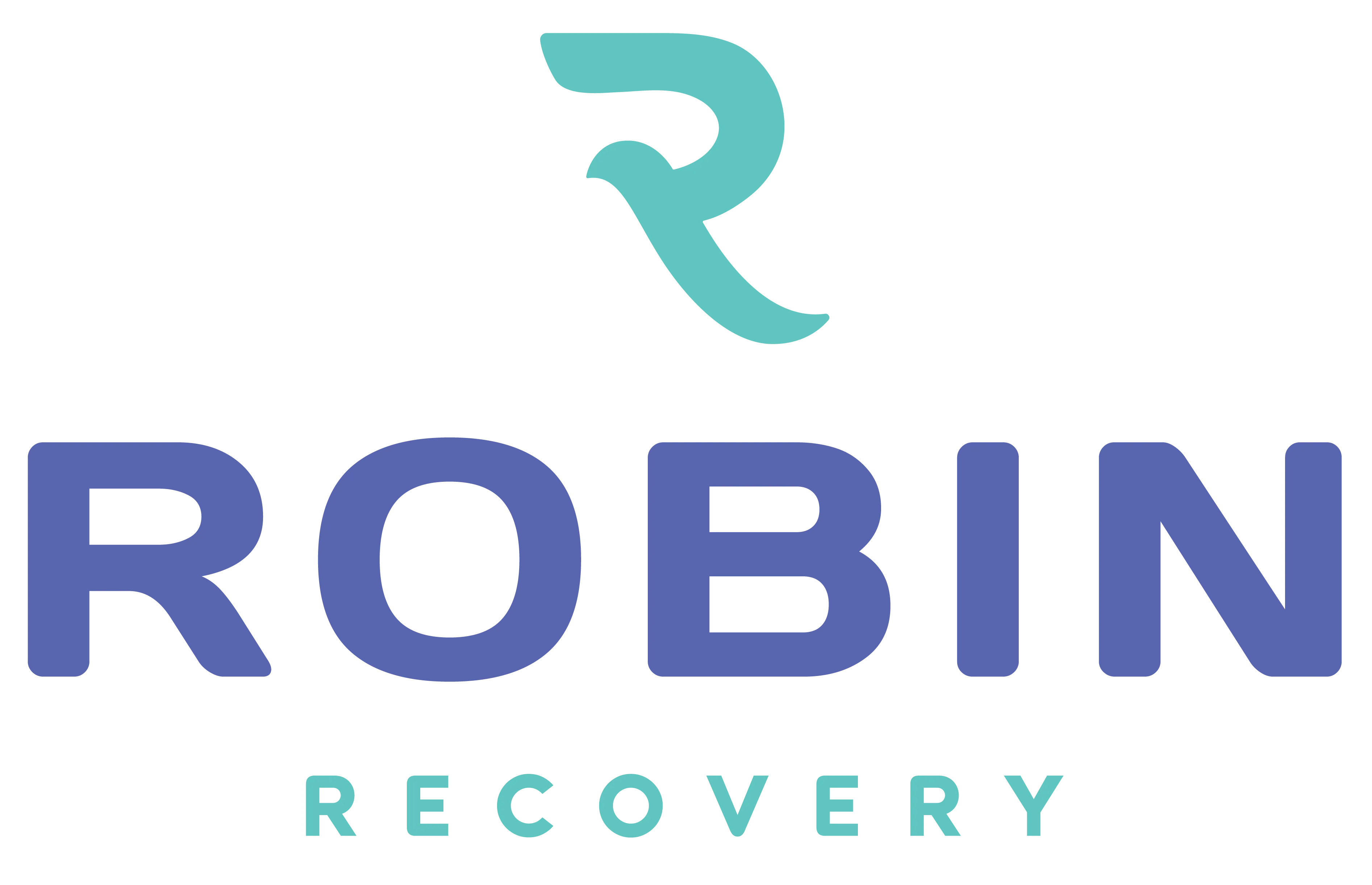Introduction
Individuals recovering from substance use disorders often face discrimination and limited opportunities due to their condition. Understanding the legal rights and protections available is crucial for fostering an inclusive and supportive environment for recovery. Federal laws, such as the Americans with Disabilities Act (ADA) and the Fair Housing Act (FHA), along with specific protections in employment, housing, and healthcare, play a pivotal role in safeguarding individuals during their recovery journey.
Federal Laws Safeguarding Recovery

What are the legal rights and protections for individuals in recovery from substance use disorders?
Individuals in recovery from substance use disorders (SUD) benefit from strong federal legal protections that aim to combat discrimination across various sectors. The Americans with Disabilities Act (ADA) prohibits discrimination in employment, meaning that individuals with SUD, who are considered disabled under this law, are entitled to reasonable accommodations in the workplace. For example, employers may need to offer flexible scheduling for therapy sessions or modify job duties to support an individual’s recovery.
The Rehabilitation Act of 1973 extends these protections further, ensuring that individuals cannot be discriminated against based on disability status in federally funded programs, including employment and healthcare services. This act reinforces access to necessary treatment resources without fear of bias.
Under the Family and Medical Leave Act (FMLA), eligible employees are entitled to take up to 12 weeks of unpaid leave for serious health conditions like SUD treatment without risk of job loss. This gives individuals the time they may need for recovery without the added stress of job security worries.
Moreover, the Health Insurance Portability and Accountability Act (HIPAA) safeguards the confidentiality of individual medical records, including those related to substance use treatment. This ensures that no treatment details can be disclosed without the patient’s consent, thereby respecting their privacy and fostering a trusting patient-provider relationship.
It's important to note, however, that while those actively using illegal substances may face limited protections, they still maintain access to health services when not engaging in illegal activity. This multifaceted legal framework plays a crucial role in supporting individuals as they navigate their recovery journeys.
Expanding Protections in Housing

How do the Americans with Disabilities Act (ADA) and Fair Housing Act provide protections for recovery individuals?
The Americans with Disabilities Act (ADA) and the Fair Housing Act (FHA) play crucial roles in safeguarding the rights of individuals in recovery from substance use disorders (SUD).
ADA considers individuals recovering from opioid use disorder (OUD) as disabled, which enables them to seek reasonable accommodations in various settings. These accommodations might include modified job duties or flexible working hours to attend therapy sessions.
FHA specifically prohibits discrimination against individuals based on their disability status, including those with a history of addiction. This ensures equal access to housing opportunities for individuals in recovery. Consequently, landlords cannot deny tenancy simply due to a past addiction history, provided the individual is not currently using illegal substances.
Protections for Sober Living Homes
Sober living homes (SLHs) are crucial for many individuals in recovery, offering a supportive environment without drugs. These homes are required to comply with both the ADA and the FHA.
- SLHs must accommodate residents seeking recovery and cannot discriminate based on past substance use.
- They play a significant role in fostering community support, which can be invaluable for discussing treatment needs and sharing experiences.
Understanding Housing Discrimination Protections
Under both the ADA and FHA, discrimination in housing based on previous or present substance use disorders is illegal. This means:
- Equal Access: Individuals in recovery have the right to equal access to housing just like any other individual.
- No Discrimination: Landlords cannot refuse rental applications based solely on an individual's recovery history.
These laws help in dismantling stigma and reinforcing that recovery individuals deserve a fair chance at both housing and continued recovery.
Defending against Discrimination
What are the anti-discrimination protections available for individuals in recovery in employment, housing, and healthcare?
Individuals in recovery are protected by several federal laws from discrimination in various key areas, including employment, housing, and healthcare. The Americans with Disabilities Act (ADA) plays a crucial role by recognizing substance use disorders (SUD) as disabilities, providing robust protections for those recovering.
Employment and the ADA: This law mandates reasonable accommodations in the workplace for employees recovering from addiction. Employers cannot discriminate against individuals who are not currently using illegal drugs, and they must keep recovery details confidential. Additionally, the Family and Medical Leave Act (FMLA) allows eligible employees to take up to 12 weeks of unpaid leave to pursue treatment without fear of job loss.
Housing Protections: The Fair Housing Act (FHA) further protects individuals from discrimination in housing situations. Landlords are prohibited from denying tenancy based on historic substance use as long as the individual is not actively using substances. This ensures that individuals in recovery have equal access to housing opportunities.
Healthcare Access: In terms of healthcare, the Affordable Care Act (ACA) ensures that people cannot be denied coverage for treatment due to a previous substance use disorder. This is critical for maintaining access to necessary support and services without discrimination.
These laws collectively create a supportive framework that helps defend individuals in recovery against discrimination in essential life areas, encouraging a more equitable path to recovery.
Ensuring Confidentiality in Treatment
How is confidentiality protected for those in recovery under legal frameworks?
Confidentiality for individuals in recovery is anchored in several key legal frameworks. The Health Insurance Portability and Accountability Act (HIPAA) plays a vital role by ensuring that personal medical information cannot be shared without the patient's consent. This means that healthcare providers must protect patient records, making it crucial for individuals in recovery to know their information is safeguarded.
In addition to HIPAA, Title 42 CFR Part 2 specifically focuses on the treatment records of individuals receiving care for substance use disorders. This regulation imposes strict limits on the disclosure of patient information, thus further enhancing confidentiality.
Additionally, the U.S. Department of Health and Human Services has made updates that allow for more expansive sharing of records when patients provide explicit consent. This flexibility is designed to encourage transparency while safeguarding privacy, assuring clients that their treatment information is handled responsibly.
Patients are often required to sign confidentiality agreements that outline how their information will be utilized within treatment settings. These agreements empower patients by giving them control over their medical records, fostering a trusting atmosphere between patients and providers, and encouraging individuals to seek help without fearing discrimination or judgment. Ultimately, these laws and practices create a secure environment, reinforcing the importance of confidentiality in addiction recovery.
Reporting Rights Violations
What resources are available for reporting violations of rights related to substance use recovery?
Individuals facing violations of their rights while in recovery from substance use disorders have several options for reporting and seeking redress. Notably, different states and national organizations facilitate the reporting process.
State Resources: In California, the Department of Health Care Services (DHCS) investigates complaints against alcohol and drug recovery programs. This department also ensures licensed treatment facilities maintain ethical standards by holding them accountable for any counselor misconduct.
National Organizations: The National Association of Addiction Treatment Providers (NAATP) has a dedicated complaint process that allows individuals to report ethical violations directly linked to their members. This pathway can help address concerns regarding quality and integrity in treatment.
Civil Rights Division: Individuals can utilize an online form provided by the Civil Rights Division to report civil rights violations. This includes those related to discrimination based on disability or treatment status. Individuals can ensure their claims are documented and addressed through this official channel.
Federal Agencies: Complaints can also be filed with the Department of Justice and the Department of Health and Human Services Office for Civil Rights about discrimination associated with opioids or other substance use disorders.
Each of these resources serves as a vital avenue for individuals to uphold their rights during recovery, fostering an environment of accountability and support.
Understanding Legal Frameworks in Recovery
How do legal rights apply to workplace, healthcare access, and treatment resources during recovery?
Legal rights play a crucial role in ensuring that individuals in recovery are treated fairly in various settings, including the workplace and healthcare. Key legislation such as the Americans with Disabilities Act (ADA) protects individuals recovering from substance use disorders from discrimination. Under the ADA, addiction is classified as a disability if it significantly limits one or more major life activities, enabling individuals in recovery to request reasonable workplace accommodations, like flexible schedules for therapy.
In addition, the Family and Medical Leave Act (FMLA) allows eligible employees to take up to 12 weeks of unpaid leave for serious health conditions, including substance use treatment, while securing their positions. Consequently, employees can focus on recovery without fear of losing their jobs.
When accessing healthcare, the Health Insurance Portability and Accountability Act (HIPAA) ensures confidentiality and the protections provided by Mental Health Parity and Addiction Equity Act (MHPAEA) mandate equal treatment coverage for mental health and substance use disorders. This means insurance plans must cover addiction treatment services similarly to other medical services, reducing financial barriers.
For those facing discrimination, organizations like Legal Aid Society (LAC) offer free legal advice, reinforcing the importance of understanding one’s legal rights in navigating recovery. Ultimately, these protections support not only access to vital resources but also work to combat stigma surrounding addiction, promoting a conducive environment for recovery.
Defining Disability in Substance Use Laws
What constitutes a disability under laws regarding substance use?
Under the Americans with Disabilities Act (ADA), a disability encompasses conditions affecting individuals recovering from substance use disorders, provided they do not currently engage in illegal drug use. This broadly protects those who have a history of addiction and have completed rehabilitation from discrimination in employment and public services.
The ADA makes a crucial distinction between different types of substance use:
- Alcohol Addiction: Protections apply even if the individual still uses alcohol, as it is classified differently than illegal drugs.
- Illegal Drug Use: Individuals actively using illegal substances are not afforded the same protections and can be subject to different employment policies, including drug testing and termination based on their substance use.
Employers retain the right to maintain a drug-free workplace and conduct drug testing without infringing on the ADA's requirements, as these regulations protect individuals who are in recovery rather than those currently using drugs illegally. Additionally, the Social Security Administration (SSA) employs strict criteria to classify substance use as a material factor in disability evaluations, concentrating on whether individuals would still be deemed disabled if they stopped using substances.
Navigating the Legal System in Recovery
How can individuals navigate the legal system regarding addiction recovery and discrimination issues?
Individuals navigating the legal landscape surrounding addiction recovery and discrimination issues can take important steps to safeguard their rights. First and foremost, consulting with specialized legal professionals knowledgeable in disability and recovery rights is essential. These attorneys can help clarify legal protections afforded under the Americans with Disabilities Act (ADA) and other relevant laws.
Seeking legal advice is vital for individuals facing discrimination. Under the ADA, those recovering from addiction should know their rights against employment discrimination, which prohibits employers from making hiring or termination decisions based solely on a past substance use disorder, provided they are no longer engaged in illegal drug use.
Engaging in rehab programs can also have a significant impact on legal matters. Participation in treatment can demonstrate a commitment to recovery, positively influencing outcomes in criminal cases and family law disputes, such as custody considerations where a parent’s substance use history is evaluated by courts.
Support Networks: How can they aid in the recovery process?
Rehabilitation facilities often provide additional support in legal matters by coordinating assistance with case managers who can help individuals navigate court systems. By maintaining open lines of communication, these facilities can advocate for patients’ rights and help them fulfill legal obligations related to their recovery.
Additionally, organizations like the Substance Abuse and Mental Health Services Administration (SAMHSA) offer valuable resources, including educational materials that empower individuals to be informed about their rights. This knowledge can be crucial in addressing stigma and advocating for oneself in various settings.
Understanding Positive Legal Outcomes
Engaging in treatment programs not only aids recovery but can lead to more favorable legal outcomes. For example, showing a proactive approach to addressing substance use issues may mitigate the severity of sentencing in criminal cases. Family law courts also favor parents demonstrating efforts to improve their circumstances through rehabilitation.
In summary, understanding one’s rights and seeking appropriate legal counsel can help individuals navigate the complexities of the legal system during recovery, ensuring that they are treated fairly and equitably.
Conclusion
Ensuring legal rights and protections for individuals in recovery is essential for their successful reintegration into society. By understanding and utilizing legal frameworks such as the ADA, FMLA, and FHA, individuals can protect themselves against discrimination, secure fair treatment, and foster an environment conducive to recovery. Ongoing efforts to educate both individuals and the broader community about these rights are vital in reducing stigma and promoting accessible recovery resources.
References
- Legal Rights and Protections for Individuals in Recovery
- Legal Rights for Those in Recovery: Taking Control of Your Future
- [PDF] Know Your Rights Fact Sheet Office of Recovery | SAMHSA Library
- [PDF] Know Your Rights brochure
- Navigating the Legal Landscape of Addiction Recovery: Rights and ...
- Understanding the Legal Rights of Individuals in Addiction Recovery
- Legal Aspects of Recovery – Rights and Procedures - Attorneys.Media
- Understanding Employment Rights in Addiction Recovery: ADA ...
- The Americans With Disabilities Act, Addiction, and Recovery for ...

.svg)

.svg)

.svg)
.svg)






































































































